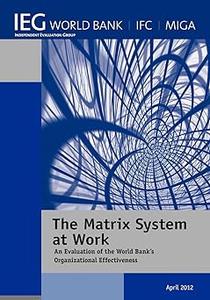
Free Download World Bank, "The Matrix System at Work: An Evaluation of the World Bank’s Organizational Effectiveness"
English | 2012 | ISBN: 082139715X | EPUB | pages: 264 | 3.7 mb
The 1997 Bank reforms that introduced the matrix management concept aimed to adapt the organization to changing circumstances and address concerns among external stakeholders about the role of aid in development. The reforms were motivated largely by widespread recognition that the Bank’s development programs were excessively driven by a culture of lending, with insufficient attention to client needs and the quality of results, which are crucial to development effectiveness. A previous round of reforms in 1987 had strengthened the country focus, but quality remained a concern. Furthermore, access of developing countries to development finance from the private sector had increased significantly, leading to a decreasing share of official development aid, including Bank financing, in total flows to developing countries. By the mid-1990s, pressure for change was acute. The 1997 reforms tried to address these challenges through a new set of organizational arrangements, increased decentralization, and matrix management. The most frequent rationale for a matrix structure is to balance competing priorities, combine capabilities for market advantage, share resources for efficiency, and retain flexibility to redeploy resources in the face of changing priorities and a diversified client base. The matrix system – a dual matrix, Bank-wide between the six Regions and four networks, and in each Region between Country Management Units and Sector Management Units – was to be facilitated by dual accountability for technical quality and an internal labor market for staff renewal and mobility. It has been more than a decade since the 1997 reorganization, and concerns that the matrix system is not delivering on its promise persist. This evaluation assesses the extent to which the dual objectives of the matrix system – enhancing client responsiveness and establishing strong technical networks to deliver quality services – have been attained and have enhanced the Bank’s development effectiveness. The evaluation focuses on implementation of the current matrix system rather than on the 1997 matrix design and follows an objectives-based approach to assess the relevance and effectiveness of the matrix reform until 2010. To the extent feasible, the evaluation also examines the efficiency of matrix arrangements.
Buy Premium From My Links To Get Resumable Support,Max Speed & Support Me
Links are Interchangeable – Single Extraction










Leave a Reply
You must be logged in to post a comment.